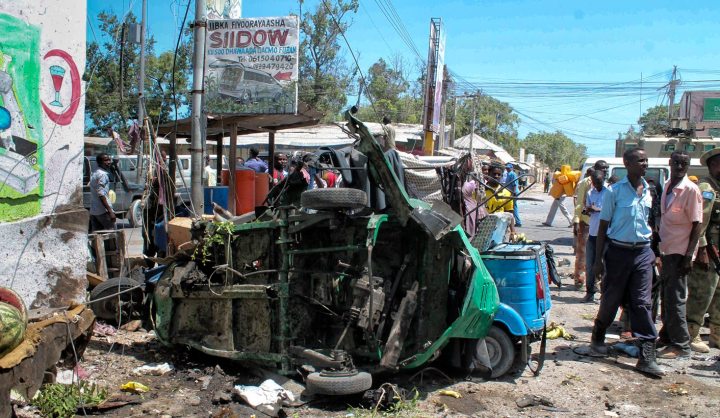Africa
Analysis: With one attack, al-Shabaab targets three elections

On Friday morning, al-Shabaab militants inflicted another heavy defeat on Kenyan troops in Somalia. Although the number of casualties is not yet known – and already much disputed – it is clear that the reverberations from this attack will be felt in Somalia, Kenya, and at the African Union, all of which are gearing up for important elections. By SIMON ALLISON.
A little over a year after Kenya’s last major military humiliation in Somalia, al-Shabaab struck again on Friday. The Islamist militant group’s modus operandi for the attack on Kulbiyow was very similar to last year’s El Adde offensive: the dawn raid on an isolated base; the use of suicide bombers to force a breach in Kenyan defences, and a willingness to take significant casualties, on both sides.
We don’t know yet how many people died, and we won’t for months – if ever. Both al-Shabaab and the Kenyan Defence Force (KDF) are notorious for faking death tolls. Al-Shabaab likes to exaggerate them, while the KDF does the opposite. So al-Shabaab’s claim to have killed at least 51 Kenyan soldiers should be treated with scepticism; as should the KDF’s assertion that only nine Kenyans died, along with 70 al-Shabaab fighters.
Regardless of the exact number of deaths, the message sent by the Kulbiyow attack is loud and clear: Al-Shabaab are still a force to be reckoned with.
This message will reverberate in the run-up to three different elections – as, perhaps, the ever-strategic al-Shabaab leadership intended.
First, in Addis Ababa, the African Union is on Monday supposed to elect a new chairperson to replace Nkosazana Dlamini-Zuma. The Kenyan troops that fought and died in Kulbiyow were there as part of the African Union Mission in Somalia (AMISOM), which makes the attack them an attack on the African Union itself. How will this affect the vote?
The question is especially pertinent for Amina Mohamed, Kenya’s foreign minister, who is one of the leading contenders to succeed Dlamini-Zuma. She will use the Kulbiyow attack to underscore Kenya’s commitment to continental peacekeeping efforts, and the sacrifices it is making along the way.
At the same time, she will hope that the summit avoids serious scrutiny of Kenya’s record in Somalia: after all, Kenya did not originally enter Somalia under an African Union mandate, while its soldiers have been implicated, alongside al-Shabaab, in sugar and charcoal smuggling rings – hardly the behaviour of a force committed to al-Shabaab’s eradication. If someone at the AU is brave enough to make the case that Kenya is in Somalia for its own narrow interests, and that those run contrary at times to those of the continent – and it is really not too hard to make that case – then this could seriously derail Mohamed’s bid for the top job.
Second, the Somali presidential election is scheduled for some time later this year (after three postponements, a final date has yet to be set). The president will be elected by parliament, as conditions in Somalia are still too unsafe to allow for mass voting, but not all members are parliament have been elected either.
In theory, this presidential election was meant to show how far Somalia had come in the last few years; that it was now a relatively stable country capable of governing itself. But the attack on Kulbiyow shows something different. It highlights that Somalia is still reliant, to an unhealthy degree, on Amisom to maintain stability and security; and that Amisom, for all its training and resources, are not always up to the job. Can we really be talking about the dawn of a new Somalia when the country remains wracked by the same old problems?
Finally, Kenya has its own presidential election, scheduled for August 8, 2017. President Uhuru Kenyatta is running for another term, and so far the polls suggest that he commands a healthy lead over the opposition. This incident, however, will not do him any favours, with many Kenyans aghast that their army was once again left exposed in Somalia, just a year after the El Adde attack. After six long and bloody years in Somalia, Kenyans are increasingly questioning what exactly the troops are doing there, and whether the government is doing enough to protect them.
For opposition parties, this is an opening. The most high-profile opposition leader, Raila Odinga, has been calling for Kenya to withdraw from Somalia for some time. He has already contested the government’s account of what happened in Kulbiyow, saying on Twitter on Saturday that “we have now established beyond doubt that tens of our soldiers died in the line of duty in Somalia” – a claim that directly contradicts the official Kenyan death toll.
While the battle rages in Somalia, in Kenya the battle lines ahead of the election are being drawn, and Somalia was always going to be a major point of difference between the ruling party and the opposition. Al-Shabaab are making it harder and harder for the ruling party to defend its position.
Al-Shabaab have always been canny propagandists, and their latest attack on Kulbiyow is no exception. While the details of the attack remain sketchy, there is no doubt that its impact is already being felt in Mogadishu, Nairobi and Addis Ababa. DM
Photo: (File photo) Somali security officers walk next to a wreckage of a vehicle in front of a government building that was attacked by militants from Islamist group al-Shabab in Mogadishu, Somalia, 14 April 2015. EPA/SAID YUSUF WARSAME
















 Become an Insider
Become an Insider